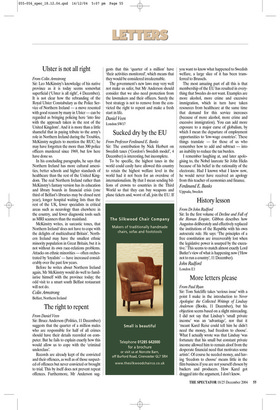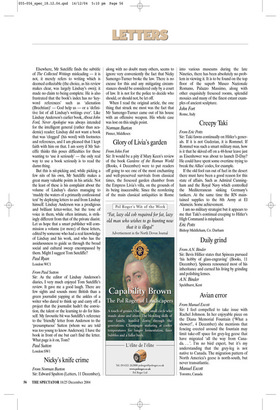More letters please
From Paul Ryan
Sir: Tom Sutcliffe takes ‘serious issue’ with a point I make in the introduction to Never Apologise: the Collected Writings of Lindsay Anderson (Books, 11 December), but his objection seems based on a slight misreading. I did not say that Lindsay’s ‘small private income’ was an ‘advantage’, nor that it ‘meant Karel Reisz could tell him he didn’t need the money, had freedom to choose’. What I actually wrote was that Lindsay ‘was fortunate that his small but constant private income allowed him to remain aloof from the desperate financial need that motivates some artists’. Of course he needed money, and having ‘freedom to choose’ means little in the film business if you are not yourself chosen by backers and producers. How Karel got dragged into the argument, I don’t know. Elsewhere, Mr Sutcliffe finds the subtitle of The Collected Writings misleading — it is not, it merely refers to writing which is deemed collectable (the choice, as his review makes clear, was largely Lindsay’s own); it made no claim to being complete. He is also frustrated that the book’s index has no ‘keyword references’ such as ‘alienation (Brechtian)’ — God help us — or a ‘definitive list of all Lindsay’s writings ever’. Like Lindsay Anderson’s earlier book, About John Ford, Never Apologise was always intended for the intelligent general (rather than academic) reader; Lindsay did not want a book that was ‘clogged’ (his word) with footnotes and references, and I am pleased that I kept faith with him on that. I am sorry if Mr Sutciffe thinks this poses difficulties for those wanting to ‘use it seriously’ — the only real way to use a book seriously is to read the damn thing.
But this is nit-picking and, while picking a few nits of his own, Mr Sutcliffe makes a great many valuable points in his article. Not the least of these is his complaint about the volume of Lindsay’s diaries managing to ‘muddy the waters of a primarily confessional text’ by deploying letters to and from Lindsay himself. Lindsay Anderson was a prodigious and brilliant letter-writer, but the tone of voice in them, while often intimate, is strikingly different from that of the private diarist. Let us hope that a smart publisher will commission a volume (or more) of these letters, edited by someone who had a real knowledge of Lindsay and his work, and who has the assiduousness to guide us through the broad social and cultural sweep encompassed by them. Might I suggest Tom Sutcliffe?
Paul Ryan London WC1
From Paul Sutton
Sir: As the editor of Lindsay Anderson’s diaries, I very much enjoyed Tom Sutcliffe’s review. It gave me a good laugh. There are few sights and sounds more British than a green journalist yapping at the ankles of a writer who dared to think up and carry off a project that the journalist hadn’t the conviction, the talent or the learning to do for himself. My favourite bit was Sutcliffe’s reference to the ‘friendly’ letter from Anderson to the ‘presumptuous’ Sutton (whom we are told was too young to know Anderson). I have the book in front of me but can’t find the letter. What page is it on, Tom?
Paul Sutton London SW1


















































































 Previous page
Previous page